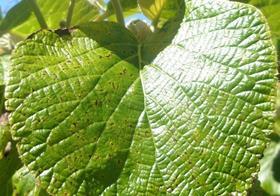
In New Zealand, Kiwifruit Vine Health (KVH) has revealed that results from its regular testing programme have showed resistance to the deadly vine-killing disease Psa-V from samples in two Te Puke orchards.
According to the group, these finds were detected in the most recent round of an ongoing copper and streptomycin resistance monitoring programme that has been in place since 2011. The programme’s aim is to ensure resistance is detected early, and the results are 'not completely unexpected'.
The streptomycin resistant Psa-V is still susceptible to copper, meaning growers can still effectively control Psa-V, KVH added.
'Resistance to streptomycin can occur naturally, even on orchards where streptomycin has not been used,' the group noted. 'KVH and Zespri are working with relevant authorities to understand the implications of this result and other orchards in New Zealand could also have streptomycin resistance. There is no evidence to suggest the resistance has occurred due to inappropriate use of streptomycin.'
Streptomycin use and resistance has previously been identified in other horticultural industries in NZ and successful management strategies have been developed to deal with this.
Industry use of streptomycin (registered and sold in NZ as KeyStrepto) is not permitted at this time of year under Zespri’s Crop Protection Standard. KVH and Zespri are reviewing the kiwifruit industry use conditions of Streptomycin for the 2016 season and will notify the industry once this is confirmed in June.
Through the R&D and product testing programme Zespri and KVH are continuing to test and identify alternative and sustainable control approaches for Psa-V. Zespri has been developing options to reduce industry reliance on antibacterial products.
KVH continues to recommend that kiwifruit growers adhere to their orchard management plans, including a robust protective spray programme, orchard hygiene and the removal of infection from orchards as per KVH’s best practice advice through autumn.



